IT'S A FAMILY AFFAIR ! Robert, Eugene and Albert Hamilton.
There is little doubt that the most famous family name in Detroit, during the late 1950s,1960s and early 1970s, was Gordy. The family's prodigal son, Berry Jnr., and the rest of his extended clan, had combined to create a musical monolith that dominated local, regional, national and international affairs at the time, and continues to exert considerable influence in the modern era. Yet, among the myriad of performers, players and promoters of the same period that emerged to augment and expand the dominance of the so called 'Detroit Sound', came a brotherhood of men (and one wife) who contributed a body of creative work as successful, popular and influential as anything produced by the Motown machine. Brothers Robert, Eugene and Albert Hamilton, along with Albert's wife Norma Toney, not only played crucial roles in the establishment of the Golden World/ Ric Tic / Wingate brands, but introduced 'outside' talents like George Clinton, Sidney Barnes, Rosie McCoy, and many others, to the Detroit recording scene, while contributing scores of memorable songs to the soundtrack of the Motor City signature. Their collective pens gave us 'SOS (Stop her on sight)', 'Headline news', 'Hungry for love', 'You gotta pay the price', '(Just like) Romeo and Juliet', 'Johnnie on the spot' 'You're my mellow', 'Can't stop looking for my baby' 'Inky dinky wang dang do', 'Real humdinger', ' The way you've been acting lately', 'Let's have a love in' 'Ooh boy', 'Baby boy' and scores more, many of which they delivered themselves as performers, arrangers and producers. Ironically, all three brothers chose not to use their family name publicly, choosing, instead, to utilise an invented pseudonym. Robert became 'Rob Reeco', Eugene adopted 'Ronnie Savoy' and Albert settled on 'Al Kent'.
The Hamilton family was raised in relative affluence on the lower West side of Detroit by parents who inspired their musical creativity from an early age. Ronnie Savoy explains ' Our parents came to Detroit in the 1920s to get away from the South. My mother came from quite a comfortable background but my father had it more difficult – he had hustled on the streets since an early age, after his mother died, when he was only thirteen. He played guitar and wrote songs – his dream was to make it as a songwriter and a singer. He would play his guitar to us coming up, usually the blues. My older brother Bobby started to pick up on the blues chords, 'cause, being the eldest, he was the first to get a guitar, but we found that music too miserable and sad.' Although the seed was sown, no pressure was applied. 'My parents didn't push us into music, even though we all began to show promise at quite an early age. My father worked at Ford and advised us not to work in a factory. It was a very happy home environment. There were nine of us all together – three boys and six girls. Bobby was the spearhead. He encouraged and led us. He was the first to start writing his own songs and singing them and that inspired Kent and me. I guess the turning point for us was when we heard Billy Ward and the Dominoes. They were our greatest inspiration. Seeing them in concert in Detroit made me want to become an entertainer. I spoke to Marv Johnson years later about this and he confirmed that he'd had the same experience!' Music's gain was sport's loss, however. 'Before I reached that decision, I was looking to have a career in basketball. Bobby was a tremendous athlete too – he was a football player, a runner, a swimmer and loved to fight. Kent was a good basketball player too. We were always getting out team mates over to the house and then singing and playing music – the two activities seemed to go together naturally.' Inevitably perhaps, the boys started their own group. 'Bobby would write songs and we would sing them with a couple of other guys that he knew. Kent wasn't in the group 'cause he was too young. In 1953,when Bobby was 16, I was 12 and Kent was only 10. I had a high voice and could sing like Clyde McPhatter. We called ourselves The Comets.' The journey had begun.
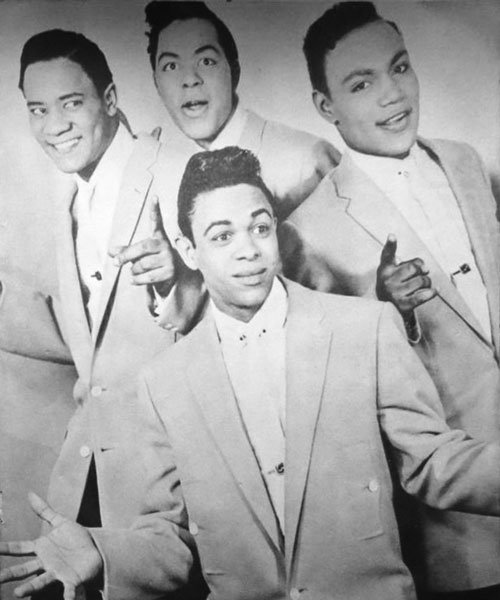
1. The Nitecaps. Back row. l to r. Bob Hamilton, Eugene Hamilton, Billy Copeland. Front. Freddy Pride.
Bob Hamilton's foray into the world of entertainment in Detroit began with the formation of his first serious singing group – The Nitecaps. According to Ronnie Savoy it also lead to their collective introduction to many of the people and places most prominent at the time. ' You have to realise that the whole Motown thing had not started and that New York was the place where all the record companies were. Bobby was a leader for our neighbourhood and our community and really put himself out there. He wrote more songs and brought in better singers. By the time we recorded some demos the group had Bobby, me, Billy Copeland and Freddy Pride in it. That would have been around 1956 or '57. Through our group, he got to meet Billy Davis around that time, and Berry Gordy too. Then my sister started dating Jackie Wilson's brother so we became aware of Jackie's manager Al Green. Jackie had just left the Dominoes and come back to Detroit. If you wanted to do anything in Detroit you had to go through Al Green. He was a gangster with many connections. He'd been a member of the notorious Purple Gang. He liked us and told Bobby to take our demos to some companies in New York.' His journey was not in vain, resulting in a deal being struck with Groove Records, a subsidiary of RCA. Savoy recalled the initial excitement at the time. ' Man, we were pumped up and really gave it our best. They released four singles on us but none of them hit big. We got to sing with Cab Calloway, we sang background for Frankie Lyman and the Teenagers, sang on local tv in New York. Al Green got us gigs around New York and we worked in Montreal and Toledo, all over the north eastern States. We were one of the first groups to sing at the Fox Theatre too. Then there was a plan to go to Paris, France to perform but I'd decided to go back to New York and start my own career. That's when I became 'Ronnie Savoy'. My middle name is Ronald, so that was easy and I just thought 'Savoy', after the hotel, sounded classy.'
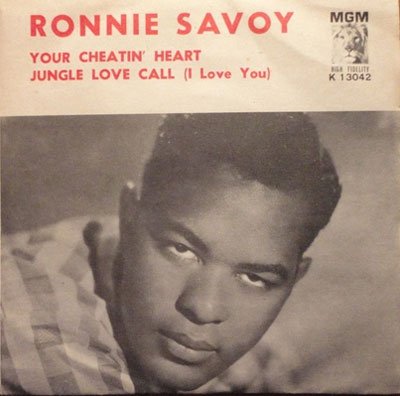
2. Ronnie Savoy
The lack of success with the Nitecaps caused Bobby to return to Detroit, whilst Ronnie stayed in New York and began to work on his own.'I was writing and singing back then and got a record deal with a small company called Candelo Records. I only did one record for them 'Once and only once' but they had no money so I quit.' After stints singing at record hops and in clubs, a new opportunity arose. ' I signed with MGM around 1960 after a brief spell with Gone Records, and I recorded 12 songs for them. 'And the heavens cried' was a big hit. It allowed me to go on the Dick Clark Show, tour the country and even resulted in an extended stay in Guatemala until a revolution started down there so we came back to New York. I was with MGM for two years, then Philips in '62 and Epic in '63, then Mercury.' Despite a reasonably successful solo career, a return to Detroit was imminent. 'Bobby called me and told me that there was a guy he knew who wanted to build a studio and that if I came back I could learn how to work the boards. I wanted to get into that and it sounded like the perfect opportunity.' His younger brother Albert, now in his early twenties, was already there, having had his own shot at fame in the Big Apple. ' I was younger than Bobby and Savoy so I wasn't in their group, but when I was just out of grade school I sang in a group I formed with Hermon Weems and Phil Townsend called The Sparrows. We did some local gigs but didn't record anything. In 1959 I went to New York. Bobby got a record deal for me with some guys he knew but nothing came of it, so I went back to Detroit. Bobby helped me to write songs and when he got with Mr. Wingate he brought me in, to sing and write. Bobby knew a lot of people in Detroit, on the street and in the music business. Creative people, musicians, singers but also people with money and connections.' The re unification of the Hamilton brothers in Detroit coincided with the creation of a group of record labels and a studio that would challenge Motown's domination of the music business in the city.
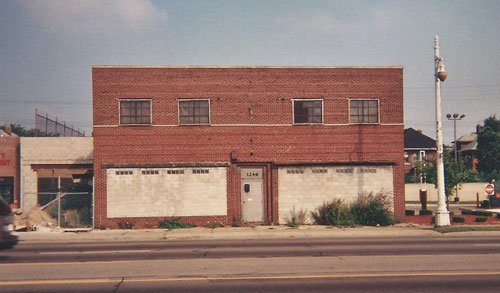
3. Golden World 3246 West Davison
Bob Hamilton's role in the Golden World/Ric Tic set up was pivotal from the outset. According to Ronnie Savoy it wouldn't have even begun without his brother. 'Golden World was his dream and it came to fruition because he was so driven to succeed. He knew Wingate from the streets and said to him 'Look what Berry is doing. You could make a lot of money.' Wingate knew nothing about recording, or the music business, but he knew there was money to be made and saw it as a good way to launder money. Wingate went along with it and told him to go ahead. Bobby scouted the building and brought Bob D'Orleans in to build the studio. He called all the key people. Don Mancha, Popcorn, Don Davis, George McGregor, Hermon Weems were all there when me and Kent came in. Mike Terry came later – around '66. It was like our own community and we were always at the studio. I was there every day working with someone or other. We would use Motown's musicians in the early days 'cause Wingate would pay them more and they could get extra money. The Hollands and Lamont Dozier would come by and listen to our stuff. If any of us recommended a good writer or producer that we knew he would bring them in. We had Sammy Lowe come up from New York. He'd done a lot of my stuff there. Charles Calello came in one time. Sidney Barnes was from New York too. We had Rosie McCoy write stuff for us. George Clinton came in and the major companies like Columbia and RCA would record sessions at Golden World. Sonny Sanders learnt how to arrange strings there. Others from Chicago would come in – Vee Jay and Brunswick artists did sessions. Some of the Philly guys too. Bob actually wrote the first big hit '(Just like) Romeo and Juliet' in 1964 and that set us on our way. It was a flourishing time. Detroit was where everybody wanted to come to and that brought a lot of musically talented people too. It had a huge population so we had our own market in the city and the State plus the regional places. We had hits that made a lot of money that didn't make it nationally. Edwin Starr took off in '65 with 'Agent double O soul' which gave us a huge boost. We had local guys come in to record or we would write for them. I got to write with my brothers or with people like Popcorn Wylie, it just depended who was around and what ideas cats would come up with.'
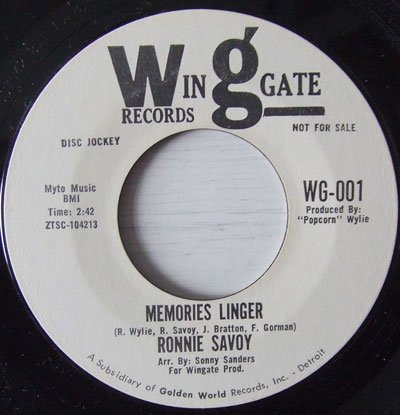
4. Ronnie Savoy 'Memories Linger'
As well as writing, producing and arranging, at least two of the brothers made their own recordings. 'Yes, I had a local hit with 'Memories linger' which I wrote with Popcorn and Freddy Gorman. The flip was written by Bobby and Fred Bridges. I was more into writing and producing at that time. I remember doing a session with Dennis Edwards before he joined the Contours. He was a solo artist but could also play the piano. I wrote one side 'Johnnie on the spot' and Bobby wrote the other 'I didn't have to (but I did)'. Dennis' girlfriend paid for that session I remember. We recorded it at Richard Becker's Pac 3 studio in Dearborn.' The joy was short lived.
1966 was a significant year in the development of Golden World positively and negatively as Ronnie Savoy recalled.' Man, we were hot by '66. We had Edwin burning it up, the Holidays, the Shades of Blue and San Remo all getting big hits and we had local hits too. Mike Terry left Motown that year and joined us to play his bari. and arrange. We couldn't use a lot of the Motown guys as much when we started getting hits 'cause they would be watching them but we had guys like George McGregor, Bob Babbitt, Johnny Griffith, Dennis Coffey, Don Davis, Ray Monette, Jack Ashford and other guys who gave us the same great sound. Everything was so easy to do – and we did things quite quickly too. There were great musicians at our finger tips, a state of the art studio and we could write our own songs and record them. Everyone had lots of ideas and everyone got a chance to present their material. We were happy when our stuff hit but really didn't realise the significance or the importance of what we were doing.' Dramatic developments took place within the Hamilton family, that would change everything, however. In July 1966 Bob Hamilton was killed. 'It was the worse time for us when Bobby was murdered during a dispute.' 'Bobby was at the core of the whole operation but Wingate never allowed him to have full control 'cause he wanted to be up front himself. If Wingate had stood back and let Bobby run things we could have surpassed Motown because Bobby was at the top of his game. If it had been someone else in charge, things would have been a lot smoother.' The fall out from Bob Hamilton's death affected Savoy's own position too. 'I stayed in Detroit for two years but I couldn't work with Wingate any more. I found it frustrating the way he would hold me back, so I went back to New York. That's when I wrote 'Pitfall' with Rosie McCoy.' His loss left only Al Kent to represent the family name in Detroit. He didn't disappoint.
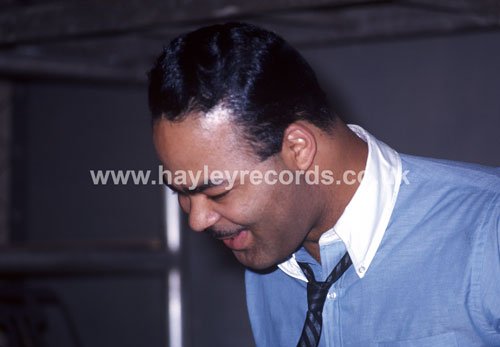
5. Al Kent. ( 2016 Sue and Ed Wolfrum. ALL RIGHTS RESERVED)
Albert Hamilton's introduction to the Golden World studio building almost ended in disaster. 'I helped Bobby get the building ready for all the equipment to be installed at the start of 1964 I think. Bob D'Orleans and some of his engineer buddies built it and we were all there when it was connected and turned on for the first time. Man, the walls started vibrating and the glass in the windows was shaking and there was this deep rumbling kinda humming sound. Someone shouted 'She's gonna blow!' and we all ran outside. I really thought the whole thing was gonna explode but D'Orleans got control of it. It was funny at the time!' As 'Al Kent' he became one of the most significant contributors to the fledgling company, as both artist and song writer. ' I had tried some solo things on my own without much success in New York, but this was different. Being in my own house, in my home city with my brothers and guys I had grown up with made things much easier and increased my creativity. I did one of my own songs for Wingate in '65, 'Country boy' and it did OK, but I much preferred to write.' Kent's writing repertoire is extensive and impressive, earning the company millions of dollars and building his reputation along the way. ' I tended to work with the same artists in the early days – Freddy Gorman at first then Edwin Starr and JJ and Rose Batiste but if I wrote with Bobby or Savoy our songs could be given to others too. The success of 'Headline' news', 'Backstreet' and 'SOS' helped establish Edwin, and J.J. was always great to work with. Because they were both songwriters themselves, they could understand, and pick my ideas up a lot quicker.' The combinations of song writing credits on Golden World and Ric Tic records were varied.' Yes, it just depended who was around and who came up with the ideas. If someone came up with an ending, or an intro or gave us a lyric we would give them a writing credit. We always spent a lot of time, sometimes more than the rest of the song, on the first few bars that would introduce the song. It was really important to us that people would recognise the song straight away, like the piano part at the start of 'SOS' for example. It usually worked. Mr. Wingate always insisted that J.J. did that 'Oooooh' sound at the start of his songs to kinda identify him. And we would sometimes give writing credits in lieu of other things, like on 'SOS' when Richard Morris and me gave Edwin a credit instead of paying him to sing – 'cause it was our session and that would have come out of our budget. He thanked us for that 'cause it was a big hit and he made far more from royalties than he ever would have done for a straight singing fee! We did the same for Joanne Bratton. She did a lot of promotion and work with distribution so we gave her a credit on some things – like 'Hungry for love' and 'Holding hands'. The other writers did it too. We all helped each other out.'
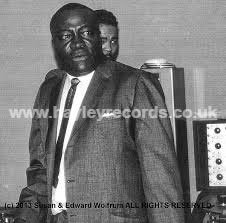
6. Ed Wingate and Al Kent.
The first phase of the Ric Tic chronicle came to an end in September,1967 when Motown bought out Ed Wingate's interest in Golden World. The Ric Tic brand was not part of the deal, as J.J. Barnes revealed. 'Not too many people know this but when the company was sold, it was only the Golden World name, the studio and the existing tapes that were sold. The Ric Tic name still belonged to the original owners and Ed Wingate reactivated the label with a different design and carried on operating. Some of our contracts were bought out too. Me and Edwin went with them.' For Al Kent it was a slightly different story. 'I'd known Berry Gordy since the 50s and when he asked my writing partner at that time, Richard Morris, and me to come over, we did, but I didn't like their system over there. It was not what I was used to. It was a lot more competitive and you didn't have as much control. I hadn't signed a contract so that when Mr. Wingate said he was going to reactivate Ric Tic I decided to go with him.' Kent not only gained the opportunity to work with artists of his choice, but teamed up with a particular writer he hadn't worked with before either.' Norma Toney was a very gifted writer, especially lyrics, who Bobby had brought in. She had written a song for the Dramatics that got our attention ('Inky dinky wang dang do') plus some other things, so Wingate put her under contract. The first tune we released on the new label was 'My kind of woman' on Edwin even though he'd gone to Motown, which she wrote on her own. I ended up marrying her and wrote some great songs with her too.'
7. Fantastic Four
The bulk of the material Kent produced for Ric Tic was recorded on the Fantastic Four at United Sound. 'Wingate couldn't use Golden World any more so he just moved everything to United. They had state of the art equipment there and a much bigger room, especially for strings. I loved working with them and I really loved 'Sweet' James' voice. He had a special talent. One of my fondest memories was when we recorded 'Goddess of love' at United. It started out as just a track 'cause we hadn't decided who was going to sing it. Mike Terry arranged the strings and they were spectacular. I was going to take the track to Columbia. LeBaron Taylor was at the session when we brought 'Sweet James' in to sing it. One of the most moving and touching moments I have ever experienced was to hear James sing it with those strings. Ooh wee. At the Motown Christmas party that year Stevie Wonder sang 'Goddess of love' in tribute. I'm very proud of all the material I did with the Fantastic Four.'
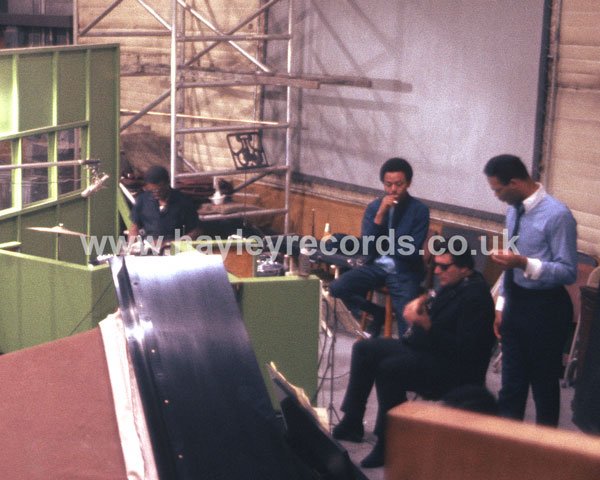
8. Al Kent working on 'The way you've been acting lately' at United Sound with (l to r Uriel Jones, Mike Terry, Bob Babbitt) (2016 Sue and Ed Wolfrum ALL RIGHTS RESERVED)
Kent's efforts weren't focused exclusively on the Fantastic Four. His first foray into the recording arena with the newly constituted label featured a song he hadn't intended to perform at all. 'I wrote 'The way you've been acting lately' with Hermon Weems. Well, we did the track first, but I sang it because I couldn't afford to pay anyone else to sing it! It didn't do a great deal here but I guess it's popular overseas. In 1967 he had a hit of his own with a backing track he had written for another artist's vocal. 'Yes, 'You've got to pay the price' was intended for Gloria Taylor. We were going to sign her with Ric Tic but at the last moment Wingate changed his mind so we put it as the flip side of a tune I put out called 'Where do I go from here' and when we released it radio DJs started playing the instrumental side! Dennis Coffey did a fantastic job playing guitar on that tune. It did so well that we followed it with another one, 'Ooh pretty lady' with Dennis again. I actually recorded 'Where do I go from here' on the Tops with strings. Eddie Holland sang background on it. Man, they nailed it.' By the end of 1968 Ed Wingate had wound up his Ric Tic operation and Al Kent had moved on too. 'Motown signed the Fantastic Four and they bought up the stuff they did with us. I did more recording with them in the 1970s too, after Motown left. My favourite project with them was the 'Alvin Stone' album. It's kinda crazy, but the best stuff I've ever done was never finished and never released. It was on a group called 'Airport' but we couldn't get a deal so it never happened.'
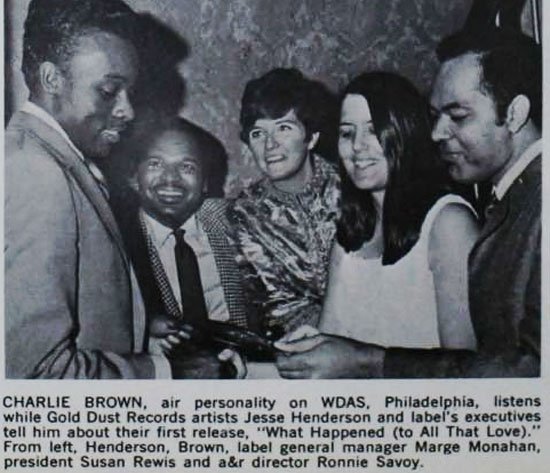
9. Ronnie Savoy launching Gold Dust Records.
By the end of 1966 Ronnie Savoy was back in New York and raring to go. ' A woman I used to sing with in New York, Susan Rewis, called me in Detroit and told me that I MUST come back to New York because she had married a multi millionaire and she wanted me help her set up a production company. We set up Suron Productions with her as President and me as A&R Director. We recorded our own artists in the beginning, people like Millie Jackson. Then we got deals for our artists with major labels and would bring in writers or I would write. We had Brenda Jo Harris at Roulette who I wrote for, and Ann Dusquesney at Capitol. We got Ike Lovely with Capitol too. Usually you couldn't get straight to the Vice President of major record companies, and miss out the A&R Director, but we did because of her husband's contacts. We even got to do two songs on the Drifters for Atlantic. I had a song that Bobby, Kent and me wrote called 'Up jumped the devil' and paired it with one of my songs 'Ain't it the truth' for them and it did OK. In 1968 we set up our own label, Gold Dust Records but it didn't do too well. We had real trouble with distribution and promotion. We just weren't big enough I figured.'
By the end of the decade Eugene Hamilton was back in Detroit and living in the same home he had grown up in. His brother was there too. They still live there today. Both men continue to revere their older brother and speak affectionately about him. This piece is dedicated to Robert 'Rob Reeco' Hamilton - a man whose vision, determination and expertise helped create much of the music many of us still treasure today.
Rob Moss
site note 10 April 2016
After feedback this article has been re-titled from 'Its A Family Affair - Robert, Eugene and Albert Hamilton 'to 'The Al Kent and Ronnie Savoy Story'
June 2016
Further edited by author
Related Soul Source Articles
-
 2
2
-
 12
12


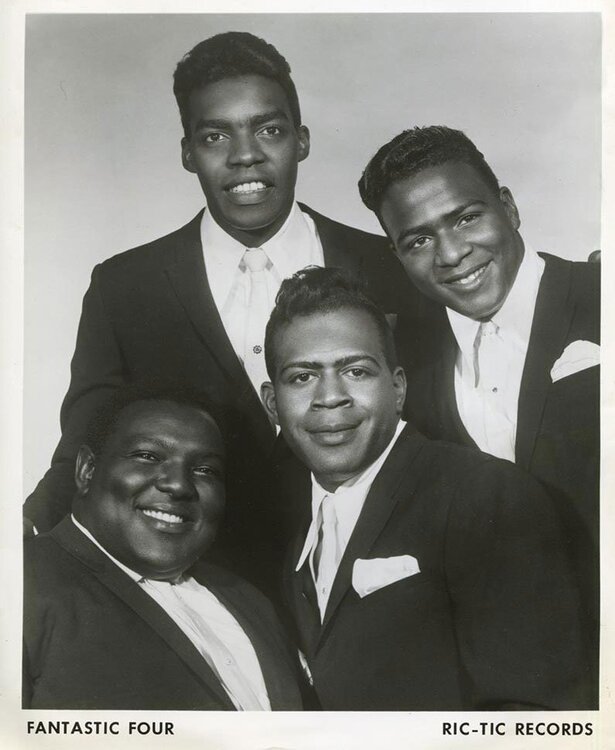

Recommended Comments
Get involved with Soul Source
Add your comments now
Join Soul Source
A free & easy soul music affair!
Join Soul Source now!Log in to Soul Source
Jump right back in!
Log in now!